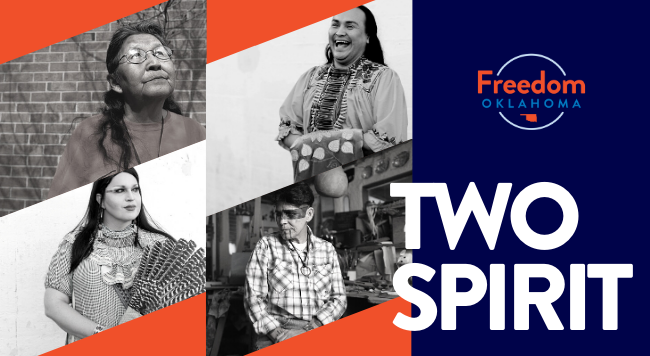Two Spirit folks are a critical part of our communities. We’ve failed to properly recognize our Indigenous communities. We’re dedicating ourselves to do better. Will you join us?
Clockwise from top left: Ma-Nee Chacaby, Ojibwa-Cree; John Sneezy, San Carlos Apache; L. Frank, Tongva and Ajachmem; Miko Thomas, Chickisaw
This LGBTQ2S+ History Month, we’re acknowledging the harm we’ve done by failing to acknowledge the first and most critical part of this nation’s LGBTQ2S+ history.
As you may have noticed in our communications over the past several weeks, we are now using the acronym “LGBTQ2S+.” We made this shift in response to thoughtful and generous conversations with members of our Two Spirit community. We are writing today to share with you what we’ve learned, and to ask you to join us in creating a community that is more fully inclusive of our Indigenous communities.
Many Indigenous people prior to colonization recognized genders beyond “man” and “woman,” often noting three, four, five, or six genders, with third and fourth gender people being referred to as “Two Spirit.” The term “Two Spirit” is an Indigenous-specific term used to describe people who are believed to be blessed with both male and female spirits. It is believed that Two Spirit people walk in two worlds, the worlds of feminine and masculine. For many nations, Two Spirit people were held in high regard. They were known to have a close relationship to the Creator, often taking on roles as medicine people, healers, and visionaries. Two Spirit people were honored and celebrated in their communities not for their gender identity, but for their wide range of skills and their ability to assume both female and male “roles.” It was not until settlers arrived, and brought with them forced assimilation that the gender binary existed widely in North America.
LGBTQ2S+ individuals and communities are no strangers to exclusion. It is precisely that experience that allows us to understand the imperativeness of intentional, deliberate, and active inclusion. Proper inclusion requires us to intentionally name Two Spirit people in our work. As a specifically Indigenous identity, asking Two Spirit people to fall under the umbrella of “transgender” is asking folks to choose between their place in this community and their Indigenous identity.
Our state is home to one of the largest Native American populations in the nation and overlaps with some of the largest reservations in the nation. And yet, at every level of government and within our organization as well, we have failed to extend to Indigenous people in Oklahoma the respect deserved. By not explicitly including Two Spirit people, we have contributed within our organization to the perpetuation of colonialism. We were wrong. We understand now. We are grateful and we will do more. Freedom Oklahoma will no longer be a place where someone must choose between being Indigenous and being a member of our community.
You’ll be hearing from us more in the coming months about our work to build a space more fully representative of our full LGBTQ2S+ community. In the meantime, we thank our Two Spirit communities for this education, hold the full responsibility for the harm we have caused, and ask you, our membership, to join us on this journey toward a community that is intentionally and specifically for us all.

